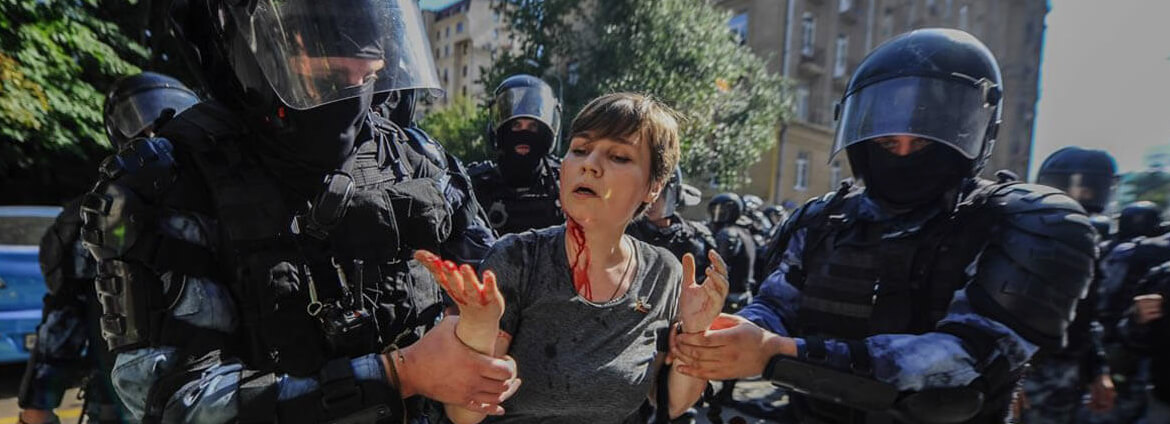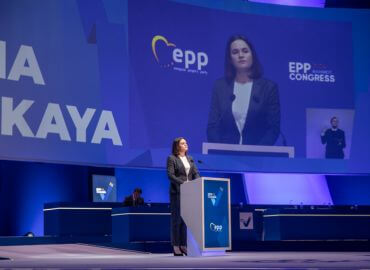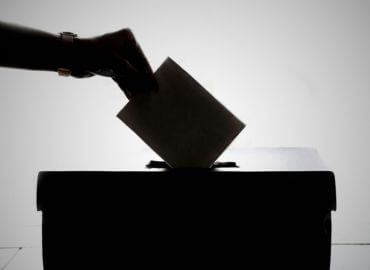POLITICAL ACTIVITY AND ECONOMY
Protests in Belarus continue for 33 consecutive days. On September 9, at least 37 protesters have been detained. On Thursday, a few people were arrested in Minsk during the actions of protest, but the exact numbers yet remain unknown. People continue to arrange solidarity chains and protest public gatherings in residential areas across Minsk and in city downtown. The goals of protesters remain purely political: they demand Lukashenka’s resignation, new fair elections, end of unprecedented police violence, and justice for the victims of atrocities that are taking place since August 9, 2020.
«Belarusians have quite incredulously found a key to cracking the monolith of a dictatorship – a development which in due time will attract global attention as a fascinating political case study. But if Belarus has ever been considered a testing ground for governing concepts that would later migrate to Russia, for Putin this uprising means that he might be facing a very uncertain reelection campaign in 2024», – claims Valery Kavaleuski in his recent publication. Mr. Kavaleuski is a former Belarusian diplomat specializing in Belarus-US political affairs and iSANS expert.
On Wednesday, August 9, president-elect of Belarus Sviatlana Tsikhanouskaya met in Warsaw with the Polish Prime Minister Mateusz Morawiecki. In her public address, Tsikhanouskaya compared ongoing protests in Belarus to the struggle of Poland’s Solidarity trade union, which helped topple communism in 1989.
IMF refused to provide a US $900+ million worth financial support that Belarus requested under the Rapid Financing Instrument. Gerry Rice (Director, IMF Communications Department) stated that no ‘ways could be found to resolve significant differences over how to respond to the current challenges’ in Belarus. He added that the IMF’s Rapid Financing Instrument (RFI) per se does not contain strict conditions, but it requires guarantees of transparency and appropriate policy measures.
Winner of the Nobel Prize in literature, and a member of the presidium of the Coordination Council Sviatlana Alexievich appealed to the UN asking to send a monitoring mission to Belarus. In that same address that was published by French Le Monde, Alexievich, (along with chairperson of the Belarusian Association of Journalists Andrey Bastunets, and Director General of the international Reporters Without Borders organization Christophe Deloire) aditionally urged the OSCE ‘to include freedom of the press on the list of priority subjects within the framework of the proposal on mediation in the crisis settlement’.
Another member of the Coordination Council, Pavel Latushka held talks with Czech Foreign Minister Tomas Petrszyk in Prague on Thursday September 10. He urges as wide range of countries as possible to support the approach that after November 5 – or since the moment of inauguration if it takes place earlier, Lukashenka will no longer have the right to perform the functions of the head of state. In Latushka’s opinion, the Coordination Council is a little frustrated by passive position of the European Union towards the situation in Belarus.
While the largest state-owned bank of Belarus, Belarusbank, halts almost all types of loans (except for preferential housing and construction savings), Reuters found out Russia’s prime minister and finance minister have told the country’s biggest state lenders to ensure liquidity continues to flow to banks in Belarus.
While protests in factories and state-owned companies continue, Salihorsk miner Yuri Korzun handcuffed himself in a mine on the depth of -350 meters on Thursday morning. He was removed from the mine, and is now subject to an administrative case.
Long-lasting dispute over a collision between Turkish and Greek warships last month in the eastern Mediterranean keeps delaying EU sanctions on Belarus. EU foreign policy requires consensus among all 27 members to pass the bill.
Leaders of 10 registered political parties (out of 15 existent) signed a resolution urging to end police violence and torture and arrange new fair presidential elections in the next 6 months. Out of 10 signatories, 4 represent the parties that were in previous years referred to as ‘pro-governmental’ meaning by that their loyalty to Lukashenka.
Belarusian Statistics Committee published the results of 2019 census. The population of Belarus made up to 9,413,446 people in October 2019. The population decreased by 631,791 people. 84.9% of the population acknowledged themselves as Belarusians (+3.7% to 2009). Russians make up 7.5% of the population (-3.9% to 2009), Poles – 3.1% (-0.8% to 2009), and Ukrainians (1.7%). 61.2% of people stated that Belarusian is their native language (38.1% named Russian).
Alexei Kulakov, an activist of Russian nationalist movement SERB, was noticed at rallies in support of Aliaksandr Lukashenka. Kulakov is pointed at as one of the participants of 2017 attack on Alexei Navalny in Moscow. Then, Russian oppositionist was then doused with brilliant green, injuring his eye. SERB movement appeared in Ukraine in 2014 from the supporters of Crimea annexation by the Kremlin. Later on, SERB movement was relocated to Russia.
Czech Prime Minister Andrej Babis vetoed a Polish proposal to invite Sviatlana Tsikhanouskaya to Friday’s Visegrad Group summit: ‘I do not want to make a hasty step that will not be in line with the pan-European position, will give ammunition to Belarusian propaganda and will in the end be counter-productive’.
INTERNATIONAL SOLIDARITY
The Parliament of Lithuania (Seimas) acknowledged Sviatlana Tsikhanouskaya as a ‘leader elected by the Belarusian people’. Seimas also will further consider the Coordination Council established at her invitation as ‘the only legitimate representatives of the Belarusian people’. Lithuania urged the international community to support their demands for new, fair and transparent elections (both presidential and parliamentary). Lithuania also calls on the international community to consider any actions of ‘illegitimate leader of Belarus Alexander Lukashenko’ null and void, as well as any agreements he will sign to restrict the sovereignty of the Belarusian people – including new international agreements with Russia.
PACE Committee on Legal Affairs and Human Rights urged the Council of Europe to immediately set up an investigative body on human rights crimes in Belarus. The materials will be made available to law enforcement bodies globally to ensure the pursue of those responsible for the atrocities. This is the first step towards international prosecution of those responsible for severe worst human rights violations and campaign of state-orchestrated torture since the Yugoslav Wars in 1990s. If Lukashenka is not removed with international pressure on top of internal protests, he will continue to push the country further towards the civil conflict, and a lot more victims will follow while the violence against the civilians continues on a daily basis for 33 days in a raw. The number of politically-motivated kidnappings by state security keeps growing since August.
Poland issued 234 humanitarian visas to the victims of political repressions from Belarus, and considers increasing the support to the civil society in Belarus to PLN 50 mln (ca. US $13.3 mln) within ‘Solidarni z Białorusią’ program.
European diplomats in Minsk stay the home of a Nobel Prize-winning writer Sviatlana Alexievich after she said masked men tried to break into her apartment in Minsk downtown. Alexievich remains the last member of the presidium of the Coordination Council to remain in Belarus at large. Ann Linde (Minister for Foreign Affairs of Sweden) posted an image of the Nobel Prize laureate commenting ‘Harassments, arrests & forced exile of opposition in Belarus is serious violation of peaceful protests by the regime in Belarus’.
The head of the European People’s Party Donald Tusk twitted suggesting nomination of Siarhei and Sviatlana Tsikhanouski for the Nobel Peace Prize ‘to pay tribute to all Belarusians engaged in this most peaceful movement in years’. He, however, was criticized heavily in response since either the Tsikhanouski family, and Belarusian national movement need more support than just an award, even thought that important. Decisive steps by the Western countries are yet a lot more needed to force Lukashenka and his near circle to resign.
Leaders of the Belarusian national movement, Sviatlana Tsikhanouskaya, Veranika Tsapkala and Maryia Kalesnikava were nominated for the European Parliament’s Sakharov Prize by the EP’s Socialist and Democrat (S&D) parliamentary group.
Sviatlana Tsikhanouskaya was awarded a special prize of the International Economic Forum in Polish Karpacz. She was officially introduced as ‘the president-elect’ of Belarus. The award was presented to her by the Polish Foreign Minister Zbigniew Rau. In her speech, Sviatlana stated the this award doesn’t belong to her: ‘This is an award of every citizen of the Republic of Belarus’.
Ukraine’s President Zelensky voiced his position on Belarus: ‘Belarusian people want justice and free and fair elections. This struggle is unstoppable, but I do not think it is compatible with an increased influence of Russia in Belarus. Belarusian people want true democracy, not Russian “democracy.” In any case, we do not support the intervention of any state in the domestic political situation in Belarus, and we believe that the Belarusian people must decide for themselves how to move into the future and what they want.’
UK Foreign Secretary & First Secretary of State Dominic Raab met the head of Lithuania’s MFA Linas LInkevicius on Thursday. September 10. Upon the meeting, he stated that the UK & Lithuania do not accept the result of the election, and the parties agreed that Belarus must uphold its OSCE commitments to democracy & human rights. Foreign Secretary Raab called for an independent investigation of atrocities conducted by Lukashenka’s regime in Belarus after 9 August, 2020.
REPRESSIONS CONTINUE
Members of the Coordination Council who were arrested yesterday, were acknowledged as political prisoners by all major human rights organizations of Belarus. The number of political prisoners grew to 60, including 4 women.
The imprisoned member of the presidium of the Coordinating Council Maryia Kalesnikova filed a complaint to report her kidnapping on September 7-8 and initiate a criminal case. She claims that she was threatened with expulsion ‘alive or in bits’ and is able identify every person on her abduction statement.
A newly-discovered video features unnecessary use of force and destruction of private property by the special units of the Ministry of Interior on August 11 in Minsk. Very graphic (18+)
The Ambassador of Ukraine to Belarus Igor Kizim made a statement that Belarusian border guards inspected his belongings when he was traveling from Kyiv to Minsk this week: ‘I was examined. They examined my personal belongings, which does not correspond to diplomatic practice. They forced me to open my car, to show what was in the trunk. For 27 years of work, I have never encountered such an attitude towards an Ambassador of Ukraine’.
Police detained a former TV host Dzmitry Semchanka. Until recently, he worked for the state-run ONT TV channel. He also headed the so-called ‘presidential pool’ – and so was among a few privileged propagandists to follow Lukashenka on his daily work trips. After the events of August 9-12, Semchanka decided to leave the state TV, and made a few critical statements against the police violence.
17-year-old Timur Mitskevich, who was a recorded victim of torture, disappeared from hospital on Tuesday afternoon (local time). He now remains missing for more than 48 hours. According to the police, the boy left the hospital room and disappeared. He was however kept under police convoy. The boy was first detained by the security forces on August 12 during the protests. He was severely beaten and tortured by OMON. On August 13, the kid was brought from the police station to the hospital with injuries so heavy that he was immediately sent into intensive care and put into a medication coma.
After the boy returned to consciousness, he was again taken to the police for interrogation – where he experienced a panic attack. His family filed an application to open a criminal case for the use of torture, but no legal protection was provided to Timur by the state yet. He was made subject to a criminal case instead.
UNICEF Belarus remains silent on numerous recorded cases of child rights abuse in post-election Belarus (including arbitrary arrests of minors, torture of children, violation of child’s rights to legal protection, and cases of child rapes that were reportedly conducted by the police on August 9-13, 2020, and of which the UN is already long aware). In numerous cases, the victims of police brutality of all ages, including the minors, become subjects to criminal charges when filing complains about their injuries that makes collection of victim testimonies very difficult.
Best regards,
iSANS team










